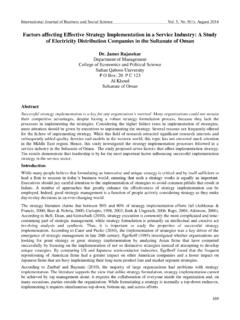Transcription of American vs. Japanese Management Style: Which …
1 American vs. Japanese Management 1 American vs. Japanese Management Style: Which One Yields Success? Martina Bernhauerova MG 201 Introduction to Functions of Management James Caldwell, Research Paper March 8, 2013 American vs. Japanese Management 2 Introduction and Thesis Statement A company without a good Management is doomed to extinction. That is why it is extremely important to choose the right Management style that would not only prevent such dreadful fate, but would also bring a desired success to a company.
2 The two mostly discussed styles that compete against each other in terms of Which one is more successful are the American and Japanese Management styles . Both styles are quite different, and the frequent debate that takes place when comparing these two involves a question, about Which one works better and, therefore, should be implemented in companies. When the economy in the USA in the 1970s worsened, the Japanese economy sustained a fairly high growth rate during the same time (Uddin, 2011). The reason behind this could be that Japanese companies were managed in a better way than the American ones.
3 Furthermore, Japanese factories have been considered to be using the best Management style with high standards for quality while having the most advanced technology (Zaman & Unsal, 2000). On the other hand, American companies have been very successful in the market as well. According to the World Management Survey, American companies seem to be excellent in their Management styles because they are able to survive for a long time; they make more profit, and they also grow faster than companies in other countries (Bloom, Homkes, Sadun, & Reenen, 2011). Many people, though, still think that American companies should learn from the Japanese when it comes to Management because they believe that Japanese Management is more efficient.
4 However, even though the Japanese Management style does seem to hold a key to running a successful company, it also has its own weaknesses that might not ensure success at all without implementing a few practices from the American Management first. American vs. Japanese Management 3 Synthesis of Information, Comparing & Contrasting Authors Views Japanese and American Corporate Social Responsibility from Richard E. Wokutch s Point of View According to an associate Management professor from the Pamplin College of Business in Virginia, Richard Wokutch (1990), the corporate social responsibility (CSR) in Japanese companies is far superior to the American one.
5 Primarily, Japanese CSR can pose as a great example when it comes to the job security and health areas. Furthermore, Japanese companies are very careful about the living environment because the Japanese have always been very reverencing towards the nature, mostly because of their religion. On the other hand, the American companies CSR demands are not being met adequately. When it comes to the job security and health, American companies are not at the same level as the Japanese ones because the social norms in America differ from those in Japan. However, Wokutch also states that some of the CSR dimensions handled in America are actually far better, and the Japanese can learn quite a lot from them.
6 Moreover, implementing Japanese approaches to CSR might not be too good because there is a difference between the emphasis on individual rights in America and Japan as well as the social environment in general. Unfortunately, the author does not mention any concrete dimensions that are handled better in America though. Japanese and American Corporate Social Responsibility from Dominique Drausnick Mals Point of View Dominique D. Mals (2012) from the Philosophy faculty at Westf lischen Wilhelms-Universit t in M nster wrote a doctoral thesis about Japan being the leader in corporate social responsibility in the 21st century.
7 According to Mals research, Japanese organizations follow the beliefs that an individual should be "contributing to the society as a whole." On the other hand, American companies are focused more on satisfying themselves first and only then comes the society. These findings might suggest that American companies could learn some American vs. Japanese Management 4 of the Japanese approaches to CSR. However, Mals does not mention whether the Japanese CSR approaches should be adapted into American companies.
8 Comparison & Contrast of Viewpoints on Japanese and American Corporate Social Responsibility Richard Wokutch and Dominique Mals discussed the differences between approaches of corporate social responsibility in Japan and America. While Wokutch (1990) sees Japanese CSR as superior to that of American companies, Mals (2012) does not belaud either one, or another. Mals simply demonstrates the biggest difference, Which is the varying perception of what is more important for Japanese and American companies. According to Mals, in terms of CSR, Japanese organizations emphasize the importance of satisfying the society as a whole whereas American companies usually focus more on their own interests before looking at the society as a whole.
9 However, even though Mals displays Japanese companies as an excellent example of CSR approaches, Wokutch believes that they do not excel in all dimensions of CSR. On the contrary, he states that there are many things that the Japanese could learn from the American approaches to CSR instead. What is more, although Mals might suggest that American organizations could implement some of the Japanese approaches to CSR, Wokutch demonstrates that these approaches will not be suitable for America due to differences between individual rights and social environment in Japan and America.
10 Employees and Job Responsibilities in Japan and America: Takeshi Ohsawa s View Takeshi Ohsawa (2010) from Human Resource Research Institute in Tokyo discusses the differences between American and Japanese Management styles in terms of employees the importance of employees as individuals, their loyalty towards a company, hiring and lay-offs, and job responsibilities. According to Ohsawa (2010), in Japanese companies, people are a lot more important American vs. Japanese Management 5 than money or anything else.










